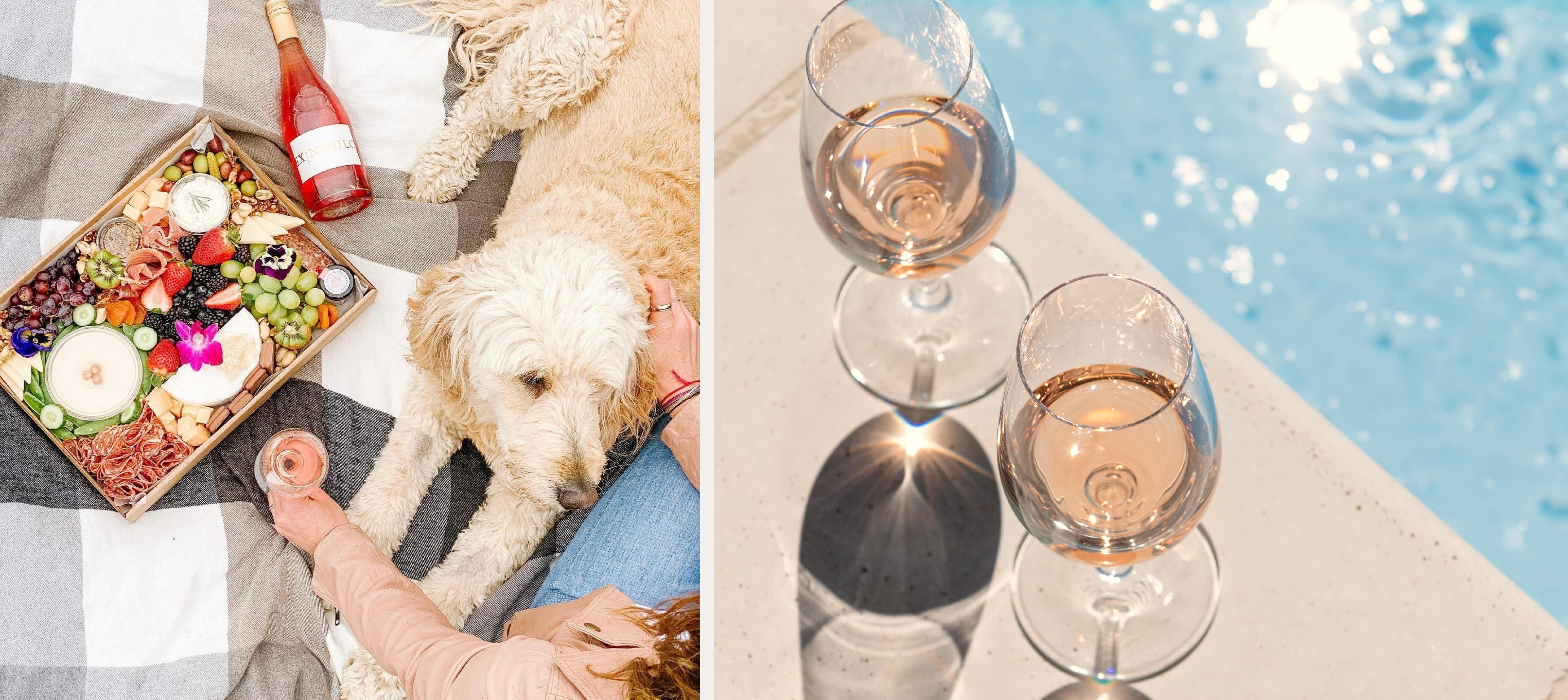Top Reasons to Do a Wine Tasting or Tour in the Fall and Winter

A Vineyard in the fall months is a sight to behold, especially in the Okanagan. As the foliage starts to show its autumn colours, and the grapes burst off the vine, beckoning harvest time, enjoying a wine tasting is a wonderful idea. Fewer crowds and milder temperatures are just a few reasons why you might want to embark on a wine tasting or tour at this time. Here are some more considerations, for those still on the fence.
A Winery in the Fall
For many wineries, visiting after the summer rush may allow you to observe some of the inner workings of the facility, from the harvest, to the winemaking process, to the bottling stage. In addition, you may be one of the first to taste a newly produced wine by sampling new releases that become available at this time!
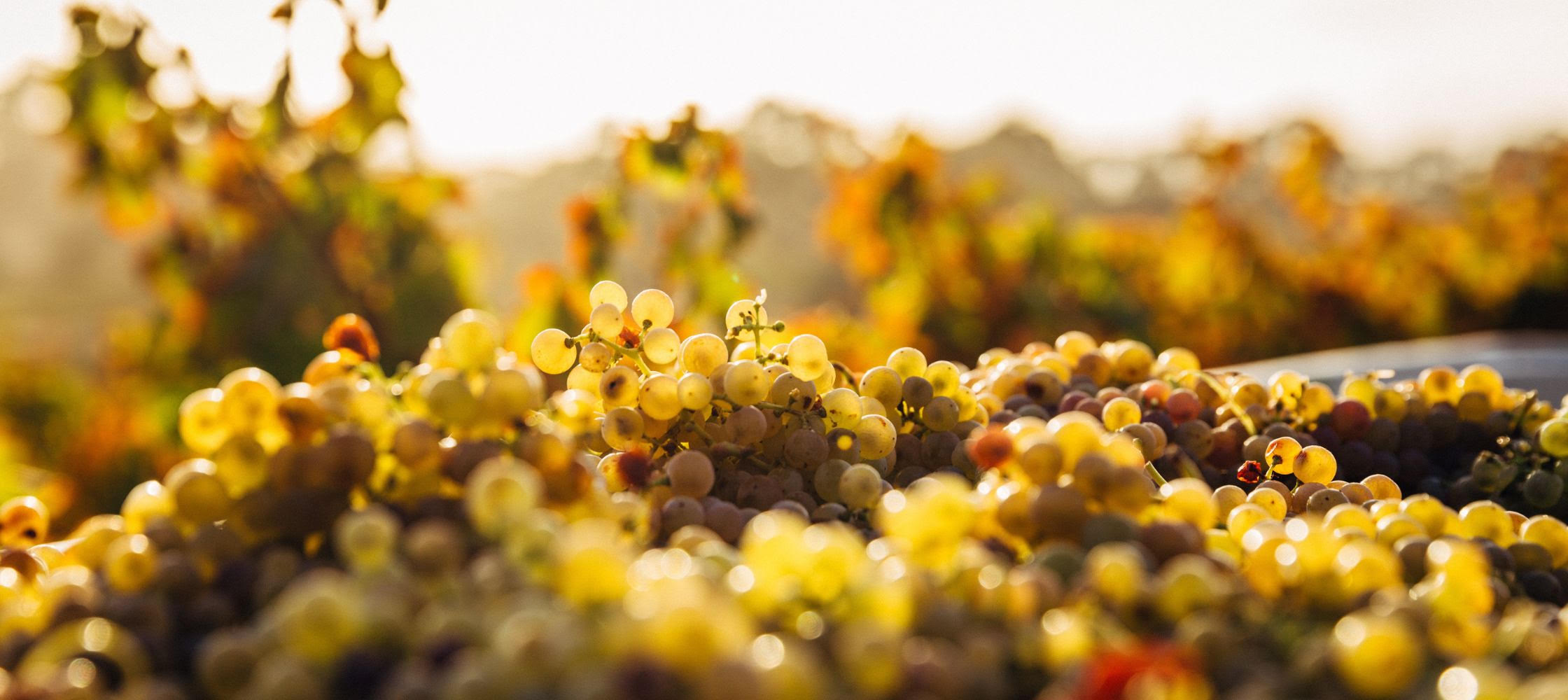
Veraison, or the change of colour of the grapes on the vine, is a beautiful sight as grapes take on their signature rich and appealing appearance, but once the grapes are ripe enough for harvesting the winemaking magic truly begins. Deciding when to harvest is an important decision, as the ripening process for a grape ends once it is picked. Harvesting a grape later will yield a sweeter taste than a grape of the same crop harvested earlier, as more sugar remains with the later-picked grape. Thus the date a grape is picked can contribute to the sweetness, flavour and alcohol content of the resulting wine.
At Ex Nihilo, wine tastings are available in the fall months and Chaos Bistro is open until October 29th, with special dinners and events throughout the winter season for our guests. Check our website for details, and subscribe to our entertaining and informative e-newsletter to keep on the pulse with what is happening at the winery during this time.
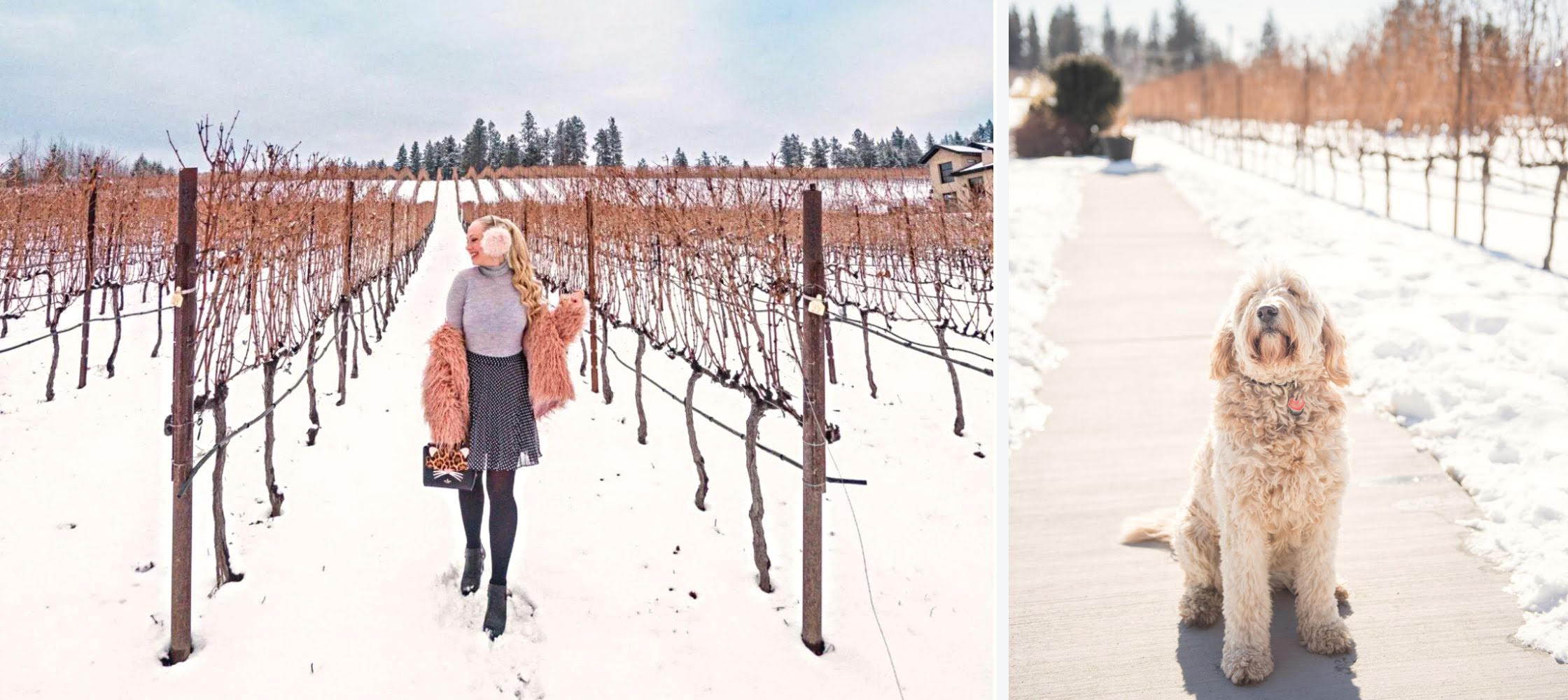
Wait, Wine Touring in the Winter?
No, you are not crazy if you are curious about wine touring in the winter. It is indeed a thing, especially in the Okanagan. Some wine tasters even swear by touring in the winter. Doing a tasting or tour in the winter is smart, as the main harvest is over and winemaking is in full force.
Of course you don’t experience the stunning budding stage of spring, the vibrant colours of fall, or the summer heat, but winter has something special to offer visitors. Staff may be more available to answer your questions in depth and give you their full attention. There are often VIP or special events and experiences to take advantage of as well.
And it is icewine’s time to shine as the temperature falls and grapes are picked frozen off the vine. Canada is one of the countries at the forefront of icewine production, and Ex Nihilo offers a few icewines that you might want to explore.

It is abundantly clear that there is much going on beneath the surface at many wineries in the winter. It is the perfect time to cosy up and enjoy a winter wonderland, with a glass of premium wine as you peer out at the vineyard quietly hibernating, and perhaps lightly covered in snow.
Note - Be sure to check a winery’s website before embarking as not all may operate to the public at this time, or may have reduced hours. At Ex Nihilo tastings appointments are recommended in the winter, but not absolutely necessary.
Wine for Every Season
While the spring and summer put lighter white and rosé wines at the forefront, the fall and winter may bring focus to more full-bodied red wines that can be consumed warmer. Snuggling up with a glass of red wine in the colder months is common, but you can obviously enjoy any wine during any time of the year!
Of course the type of wine we choose does not solely depend on the temperature outside, but many other factors, such as the seasonal foods and meals you are enjoying. Having a hearty beef stew to celebrate a bountiful harvest? Perhaps pair it with a medium to full bodied red like our 2018 Privata Malbec, offering up notes of cherry, blueberry, star anise, and eucalyptus on the nose. Enjoying a rustic roasted chicken and veggies around the dinner table? A rosé may be an appropriate addition, and chardonnay can go well with many savoury seasonal foods of fall and winter. Overall wine sales are quite high in the winter, making it clear that people like their wine year round!

The Okanagan is known as a “four season playground” and the wineries in the region bring no exception. There is a common misconception that a winery’s doors close as the summer ends, but this is just not often the case. In fact some of the excitement is just beginning! For ideas of what to wear and etiquette for a wine tasting, check out our article “Wine Tasting and Touring Etiquette”. Doing a wine tour or tasting in the cooler months can be a very rewarding and fun experience. See you soon!

Top Tips For Storing & Cellaring Wine

Bringing home a new or favourite wine is exciting. Perhaps you are ready to enjoy a glass right away or within a few days, but what about when you want to keep it a little longer, build a collection, or have a stock on hand for that special guest or dinner party? Here we provide some tips for you, to ensure the best tasting wine when you finally do decide to pop the cork.
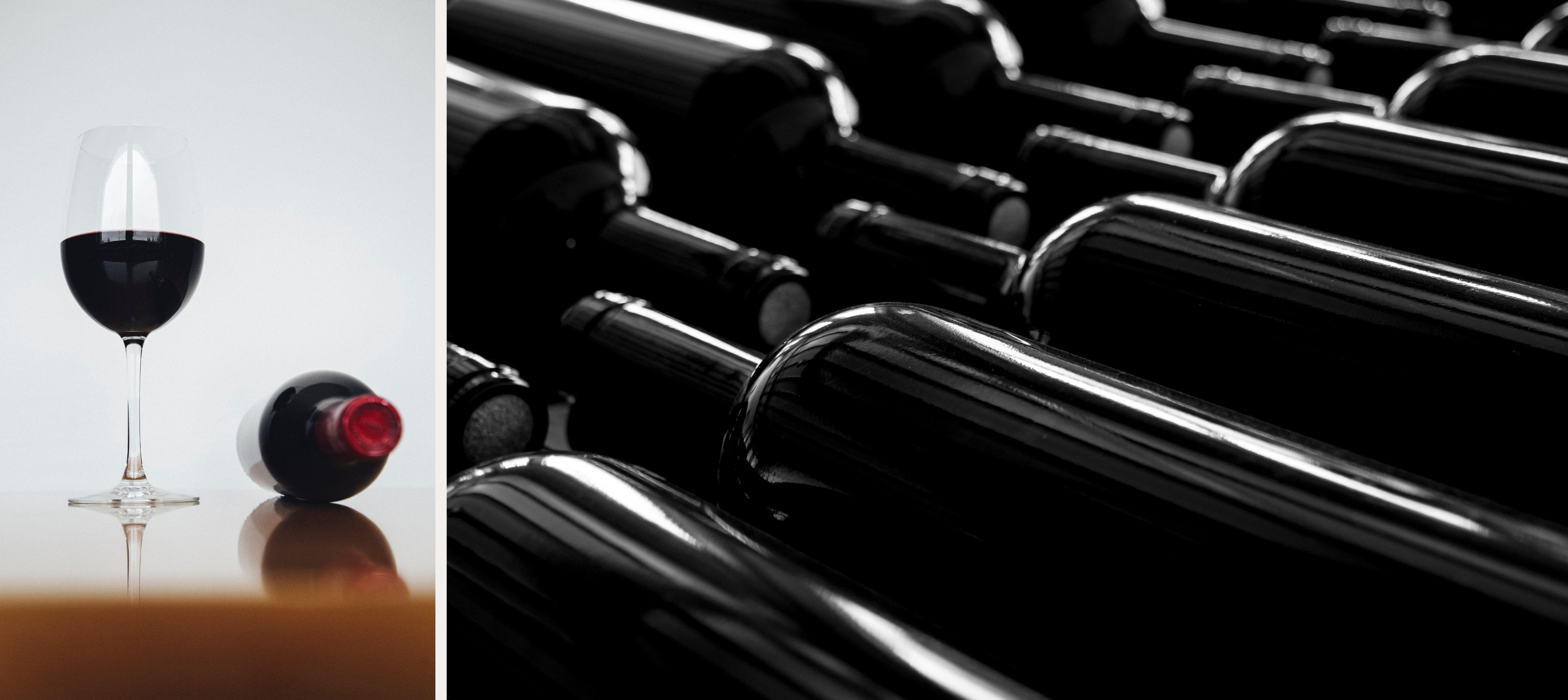
Short-term vs. Long-term Wine Storage
When it comes down to it, most wine is not meant to age very long. According to Wine Folly, the majority of wines you purchase are released within 2 years from being grapes, followed by an often relatively short time in the bottle before being consumed.
That said, not properly storing your wine can mute, or negatively affect wine development and/or cause it to decline or spoil prematurely. Access this handy chart to reference how long different types of wines should be stored away or cellared before consuming.

After you have determined what wine you want to cellar and how long it should be stored for, here are some good tips to consider:
Find a dark, dry spot, and keep wine out of direct sunlight.
UV rays can damage the wine, causing it to break down, affecting such properties as taste, colour and aroma. Note: The reason why many bottles have a tint to them.
Make sure the temperature and humidity of the area you are storing the wine in is ideal & consistent.
Too cold of a temperature will stifle the ageing process, while heat increases this rate, requiring the wine to be consumed sooner. Too dry of an environment can cause the cork to dry out.
Don’t move the wine around too much.
Excess movement or storage in a high traffic zone with vibration can cause the sediment to move around, which is not ideal.
Store corked wine on its side.
This is commonly known, but many people don’t understand why. Storing the bottle on its side, leaves the cork in contact with the wine, keeping it moist. A cork that dries out may shrink, and allow oxygen in which can cause spoilage.
Don’t store your wine near strong smells or odours.
Doing this can affect the taste of the wine, especially with corked wines, as the corks are porous and may allow unpleasant smells to seep in.
Avoid storing the wine in the fridge for too long.
A fridge is meant to keep food dry and cold, and is ok for short-term, but the settings are not ideal for wine storage. Consider purchasing a wine fridge for this purpose.
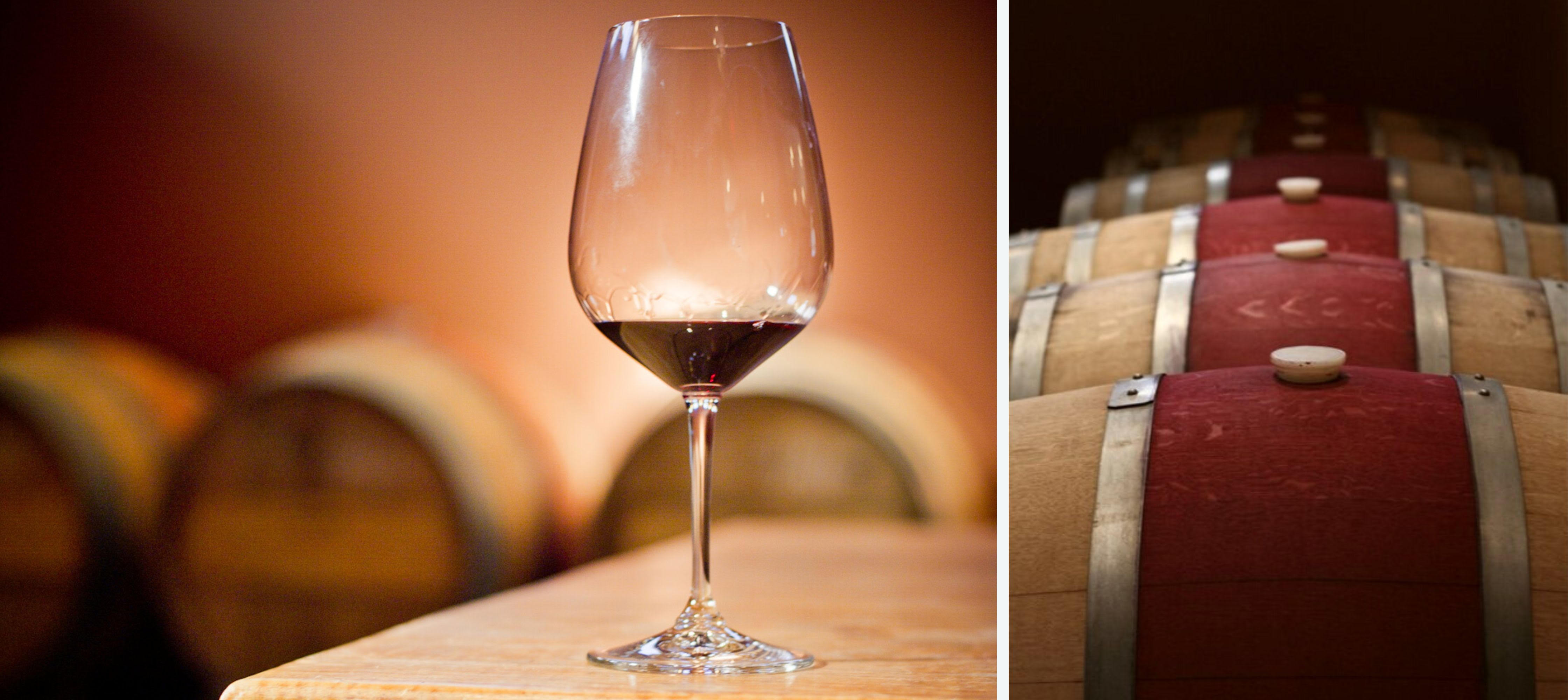
Ageing Like a Fine Wine…
We’ve all heard the saying. Like with us humans, it can take time for a wine's complexities, true essence and beauty to fully come forth. Wine is first aged or matured somewhat before bottling in a batch process within vessels often made of oak, stainless steel, or ceramic material. According to The Wine Atlas of Canada, reds are usually aged like this for 1-2 years and whites generally less. Once transferred to the bottle, wine continues to age.
Ageing in the bottle differentiates wine from “spirits”. For example, spirits such as gin and Scotch do not change over time in the glass bottle, but wine continues to develop, mellow, and take on a more intense “bouquet” before eventually declining.
As referenced above, certain wines are better than others for long-term ageing in the bottle. Often red wines cellar better as they tend to be higher in tannin content. Tannins act somewhat as a preservative, helping stabilise the wine. Other factors play a part as well such as alcohol content, acidity and sugar.
Wine That’s How Old?
Of course the internet is littered with articles and videos of wine enthusiasts unearthing some insanely expensive and old wines, and some really stand the test of time, despite being a century old or more! A wine will reflect certain aspects of the year it was grown and produced in, which adds to the novelty. Curious about what a wine from the time of Abraham Lincoln tastes like? Check out this video of an expert sommelier tasting a 159 year old wine!
The Baltic Sea’s Perfectly Cellared Champagne
Everyone once and a while, nature provides the perfect environment for cellaring. One such example is one of the most expensive champagnes you can find, the 1907 Heidsieck Monopole Gout American. Referred to as, “shipwreck champagne”, it was found at the bottom of the Baltic Sea in the wreck of the Jönköping in 1997. The wine had sat there for almost 80 years in ideal conditions under the water. When it was finally rescued and opened, it was found to taste amazing!
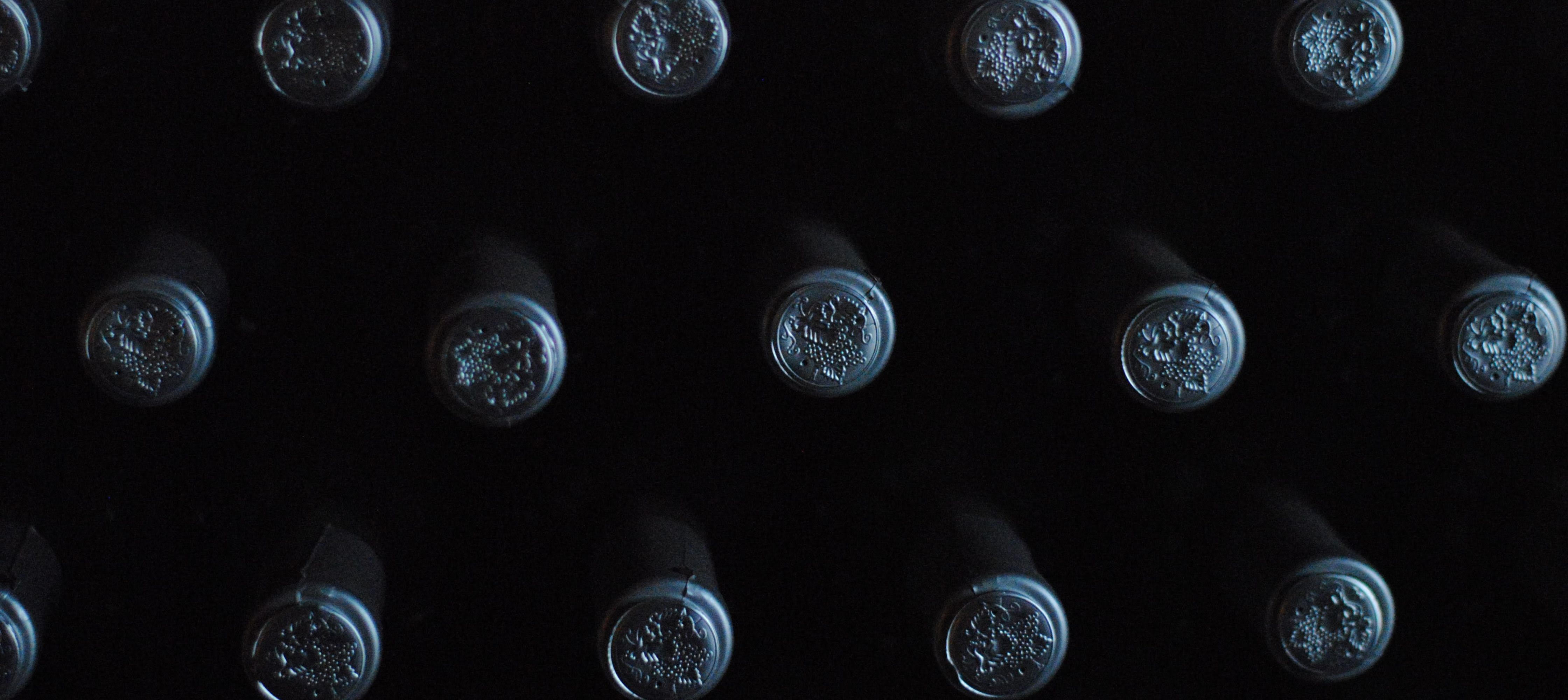
You might not be planning on keeping your wines for over 100 years but it is still good to know how to properly store and cellar them. Just taking a bit of time and effort to create the right environment for your collection will go a long way in making sure that when that wine hits the glass it is tasting the absolute best it can.

An Okanagan Valley Chef’s Journey - An Interview with Ex Nihilo’s Executive Chef, Danny Tipper

At Ex Nihilo’s Chaos Bistro, we are fortunate to have a small team of amazing individuals working hard behind the scenes to ensure a fantastic guest experience. One such person integral to creating culinary magic in the kitchen is our Executive Chef Danny Tipper. A few minutes spent chatting with this meticulous and driven chef reveals a strong culinary passion for creating enticing flavour profiles and combinations within every dish he prepares. We had an opportunity to sit down with Danny to learn more about him and his journey as a chef.
The Story Begins in Grandma’s Garden
Growing up Danny looked forward to visiting his grandmother’s house where the aroma of baked bread often welcomed him, along with fresh salami & delicious home-cooked meals. He would spend hours helping his grandma in the kitchen and wandering through her large garden, picking strawberries and beans straight from the vine.
His first especially vivid memory of learning to cook was at Thanksgiving when his grandma shared with him the art of making a roux. He was privileged with the task of adding the wine into the gravy the family would enjoy later that night. Knowing how to make a good roux came in handy during subsequent visits, as she would teach him how to make delicious soups from scratch.
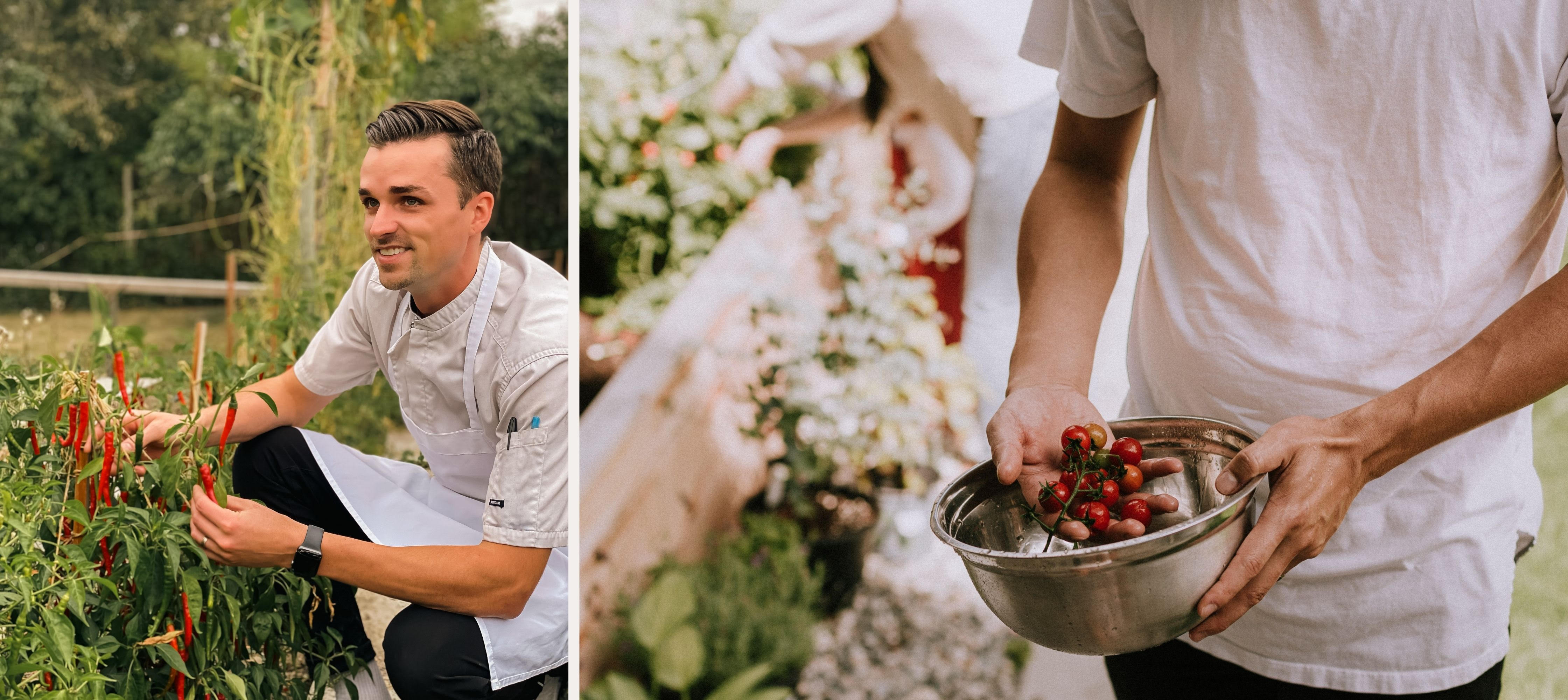
Then there were stories of the great-great-grandfather he never had the chance to meet from the Netherlands, a chef at the famous ‘Hotel Amsterdam’. Perhaps, young Danny pondered, he would follow in his relative’s footsteps. A seed was planted that would eventually grow into a full-fledged dream.
Coming Full Circle - The Life Cycle of a Winery
Danny had grown up surrounded by Okanagan Valley wine culture, and after attending culinary school in Vancouver it seemed a natural direction for him to explore. His quest to cook first took him to Quails’ Gate Estate Winery in Kelowna, which would be his first time working in a winery kitchen. He subsequently became “hooked” on the winery scene, largely due to the sizable garden he had access to for sourcing his ingredients. Life seemed to have come full circle in a way, to the days of his youth spent in his grandmother’s garden.
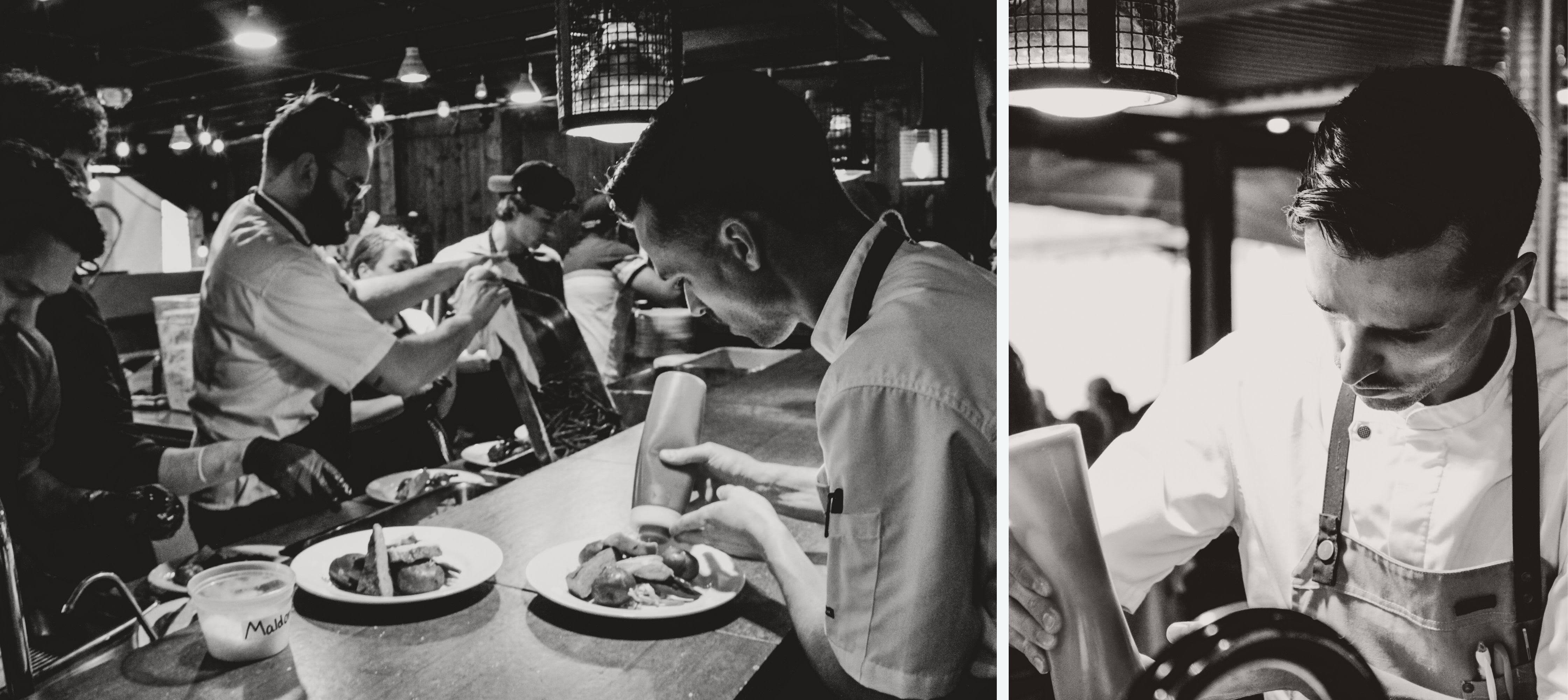
Waterfront Wines Restaurant in Kelowna would be his next stop, and it was here that he learned much about wine and food pairing, further refining his palette and art as a chef. He grew to be more of a connoisseur of great wine and food combinations, learning about flavour profiles while gaining valuable knowledge that would help him ‘level up’ in his craft. He was now ready to embark on the next leg of his adventure, bringing him briefly to Graymonk and then on to Ex Nihilo when the opportunity presented itself.
When asked about what he likes about working as a chef at a winery, Danny tells us a big draw for him is the life cycle at a winery, which mirrors the seasons and cycles of nature. Spring brings new buds in the vineyard, along with the anticipation of the busy season. Summer entails growth on the vines and a constant hum of excitement at the winery. Fall yields the harvest as winery activity calms, and in the winter the vines go dormant, which is coupled with time for winery staff to catch up and plan for the upcoming year. The pace is not constant & unrelenting as it is with many restaurants. There is a time for everything, including reflection, and that is key.
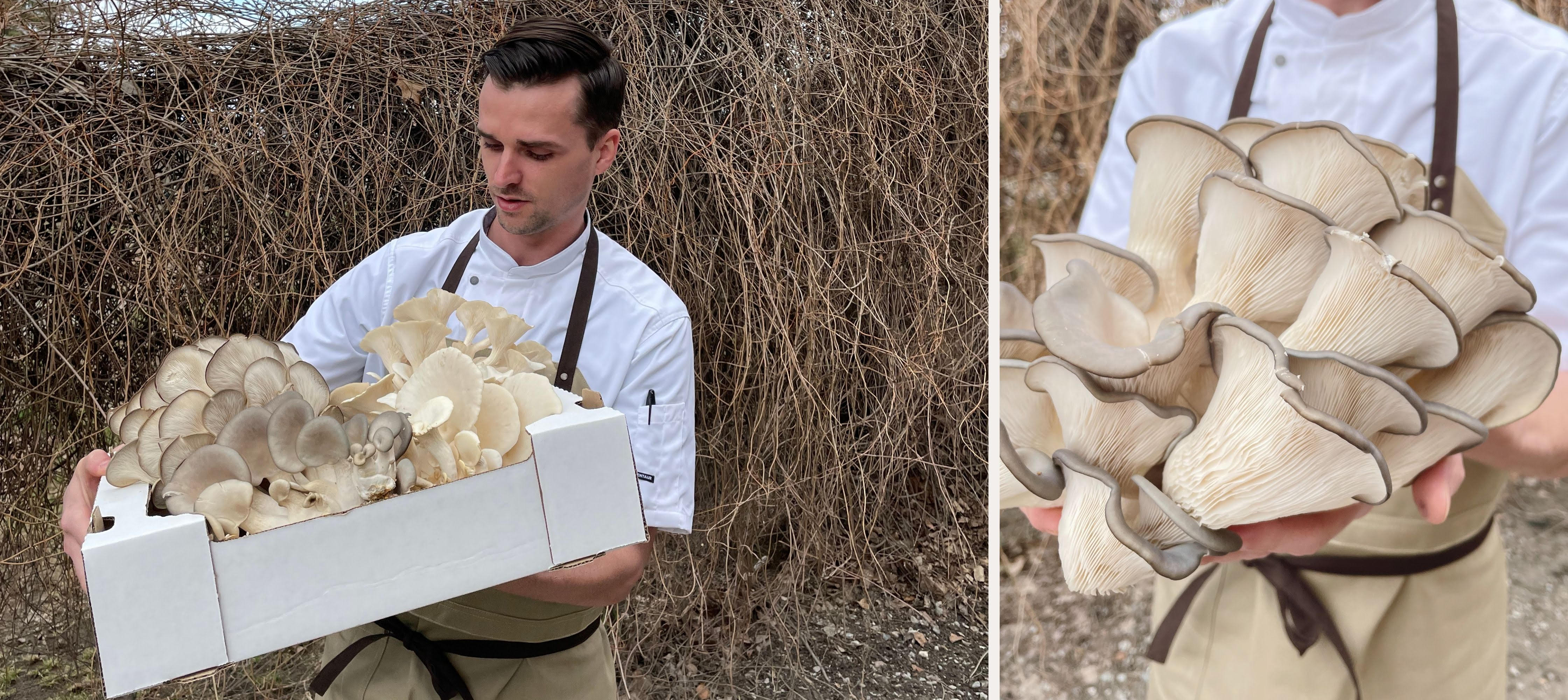
The Farm to Table Philosophy
The simple farm to table cooking standard first appreciated in his childhood now permeates Danny's every day. At home, his family enjoys a huge garden and a constant inflow of fresh ingredients like he did growing up, and his own children enjoy helping out in the garden and kitchen just as he did as a little boy.
At Ex Nihilo’s Chaos Bistro he is able to extend this same ideology. Every day he ventures to a neighbouring farm to access such fresh staples as tomatoes, basil, and herbs, all of which make it into the in-house prepared tomato sauce for gourmet pizza and other mouth-watering menu items. Cheese is sourced locally from Tanto Latte Cheese; Abundant mushrooms come from Lake Country Gourmet Mushroom Farm, and a longstanding relationship exists with Dueck Falkland Farms. The list goes on, and he is constantly fostering new relationships with local suppliers to acquire premium fresh ingredients for his culinary creations, supporting the local economy while bringing scrumptious combinations to the plate. (Note: Read more about Ex Nihilo’s local suppliers in our blog article: Supporting Local With Ex Nihilo).
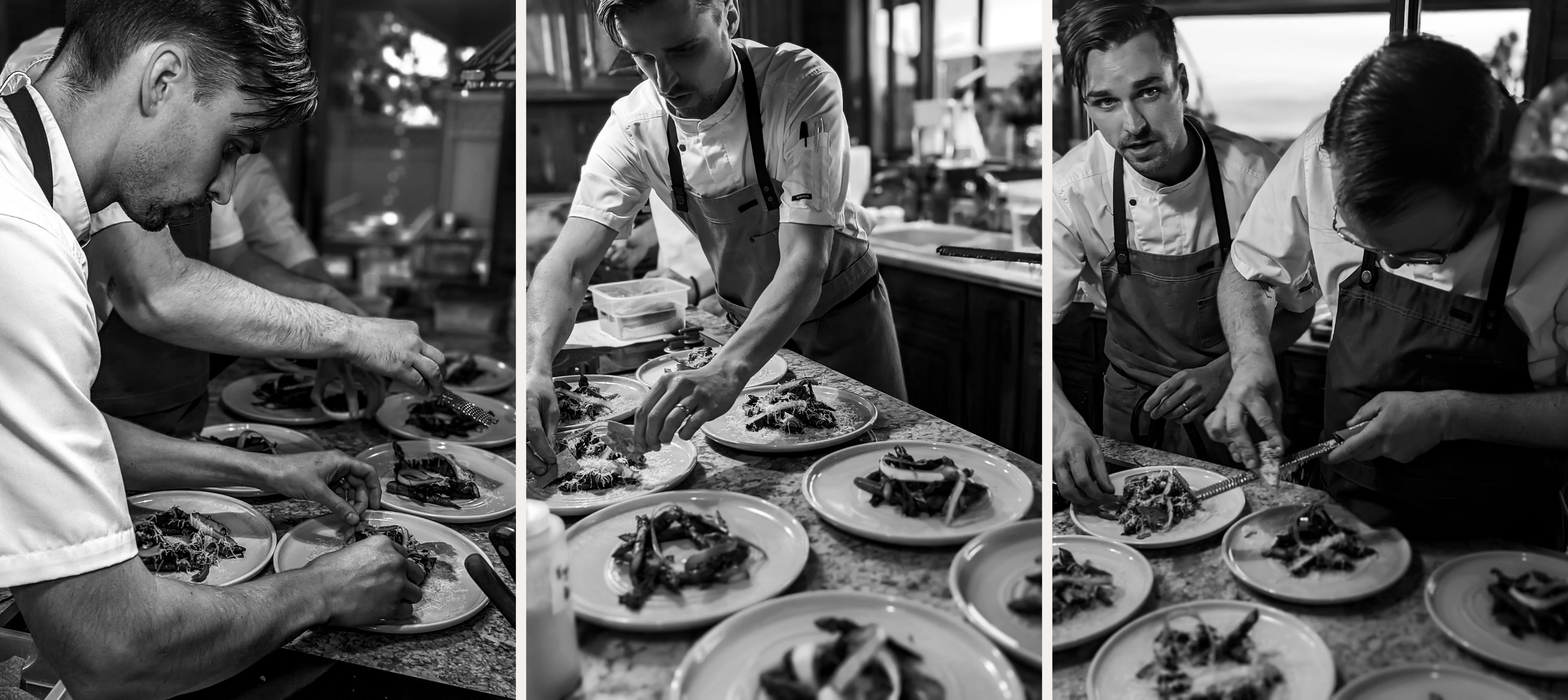
Chef’s Choice
There are always a variety of wonderful selections on the menu at Chaos Bistro, but we just had to know Chef Danny’s current favourite. He was happy to oblige our curiosity:
“Right now my favourite dish is our BC Scallop Crudo. I have a fairly high acid palette so I enjoy the green apple and citrus. It also pairs fantastic with our EXN 2021 Riesling which mirrors a lot of those same citrus, granny smith apple, and herbaceous notes that the dish provides. A summertime must.”

What Does the Future Hold?
Danny is excited about the future and the "bursting potential" at Ex Nihilo. After spending some quality time in the cellar last fall with winemaker Jim Faulkner, he was able to coordinate and come up with some great combinations for the ongoing Dinner Culinary Experiences and Concert Events at the winery. Spending time with Jim has fostered more of an understanding regarding the winemaking process as a whole, deepening his already extensive knowledge of the wine varietals he is working with every day. Overall we have not yet seen all this talented chef has to offer!

Raise Your Glass To National Wine Day

Every day is wine day, right? Well maybe not, but May 25th is. It’s National Wine Day! Take this opportunity to learn about all things wine, and grab an idea or two on how to responsibly commemorate this special day.

Just how was wine invented?
Statista defines wine as, “an alcoholic beverage produced by fermenting grapes and sometimes other fruits or plants”. It is really hard to pin down exactly how and when wine came to be, but it is believed by some that wine may have been invented by accident between 6000 and 3000 B.C. or earlier, in the area that is now modern day Iran and Georgia, when stored grapes were fermented by wild yeast.

Christian monks had a role in making France one of the best wine making countries in the world. They took detailed notes on different varieties of grapes, growing methods & practices. In the new world region, i.e the Americas, it is believed that the Indigenous people may have played a part in wine’s emergence. However it came to be, it appears to have been a bit of a group effort and a happy invention, as people all over the world continue to enjoy this staple beverage.

History of the Okanagan Valley Wine Region
Ex Nihilo is located in the Okanagan Valley wine region of B.C., which has an interesting history, starting with Father Pandosy, a Frenchman who recognised the fertility of the land. He grew and produced wine for sacramental uses at the Oblate Mission in Kelowna in 1859. Following this, more wineries emerged until prohibition slowed down the growth somewhat. As time went on however, wine makers in the valley began experimenting with hybrid grape varieties. This resulted in a marked increase in the quality of wine in the area and a vibrant industry and scene began to take hold.

The rest is history as, according to Forbes, 85% of B.C.’s wine is produced in this magical area, which resides between the 49th and 50th parallel, the same latitude as Champagne, France and Rheingau, Germany. Consisting of about 9,000 acres of vineyards, it is Canada’s second largest wine region with over 185 wineries.

The Wine Industry in Canada and British Columbia
The wine industry is certainly substantial in Canada. According to Statista, red varieties are most consumed, but of course Canadians’ enjoyment of this diverse drink does not stop there. Retail sales of wine in Canada are forecast to exceed 13.2 billion U.S. dollars in 2022, showing that Canadians like their wine. According to per capita sales, consumers in Quebec purchase the most wine and those in Saskatchewan purchase the least. What's more, due to its colder climate, Canada is the top producer of Ice Wine in the world.
Below are the Top 10 white and red wines produced in B.C. according to the Wine Growers of BC:
| White: | Red: |
|
|

How to Commemorate National Wine Day
It may seem like a bit of a no-brainer, but here are some creative ideas to capitalise on the day!:
- First and foremost, come enjoy Happy Hour with us at Ex Nihilo if you are in the area.
- Do a wine tasting or two and discover something new. Use this occasion to try a new wine that you may not normally have considered.
- Visit a winery restaurant and pair tasty culinary bites with premium wine choices.
- Pick up your favourite wine to enjoy it with a friend.
- Plan to host your own wine tasting party.
- Learn more about wine making processes, tasting, pairing, and more. You can start by reading through previous articles in this blog.
- Book yourself a future tour or wine tasting to look forward to.
- Sign up to be part of a wine club, like ours at Ex Nihilo. And while you are at it, sign up for our newsletter below!
- Try a wine and yoga class in your area.

Additional Wine Days
Believe it or not, there are quite a few days throughout the year to celebrate wine, included on the National Day Calendar:
1. National Drink Wine Day – Feb. 18
2. National Mulled Wine Day – March 3
3. National Bubbly Day – First Saturday in June
4. National Moscato Day – May 9
5. National Rosé Day – Second Saturday in June
6. National Strawberry Rhubarb Day – Third Saturday in July
7. National Wine and Cheese Day – July 25
8. National Prosecco Day – August 13
9. National Orange Wine Day – October 6

The Legacy of Wine
Wine is considered by some to be a symbol of transformation, a concept which we can observe throughout all stages of the growing and winemaking process. What’s more, it has influenced cultures throughout time, and connected people from all different walks of life. A much beloved and diverse beverage of choice, the world of wine is one that could take a lifetime to fully explore as there is always something new to learn. So take a moment today to join those around the world and raise your glass!

Ex Nihilo Releases Its First Ever Gewürztraminer!
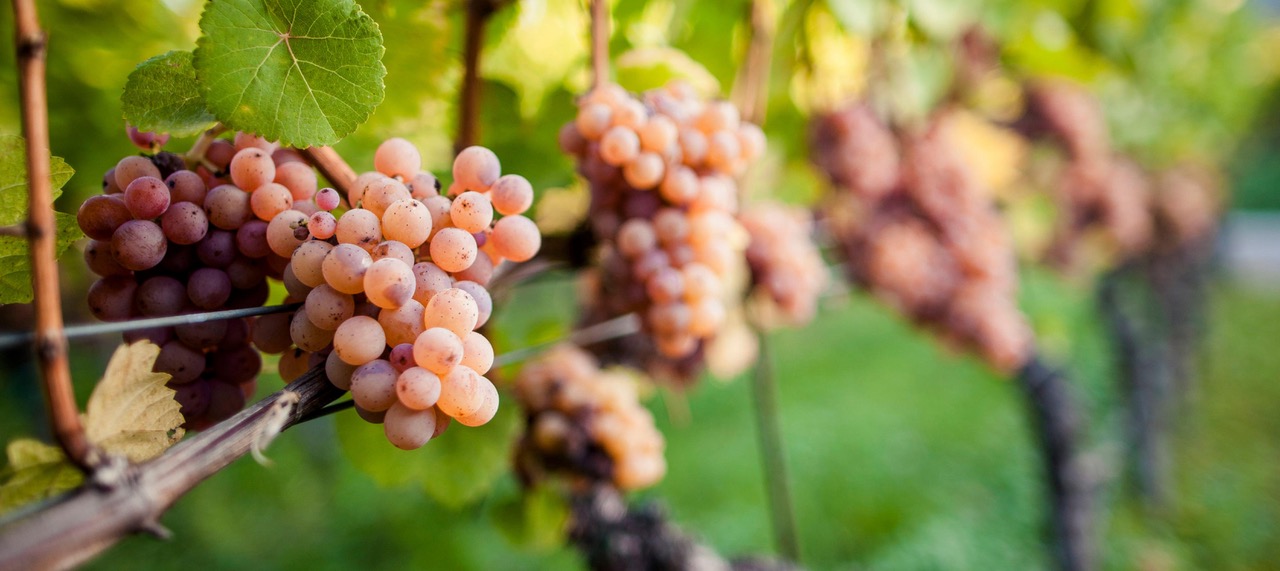
A wine that is hard to pronounce (ga-VERTZ-trah-mee-ner), with an intense taste, Gewürztraminer is a bit of a curious enigma. Yet those who enjoy a good Gewürz stand by this wine! Popular for centuries around Germany, Gewürztraminer has grown in popularity around the world. It hails originally from Alsace, located on the border between France and Germany, from the Gewürztraminer grape.
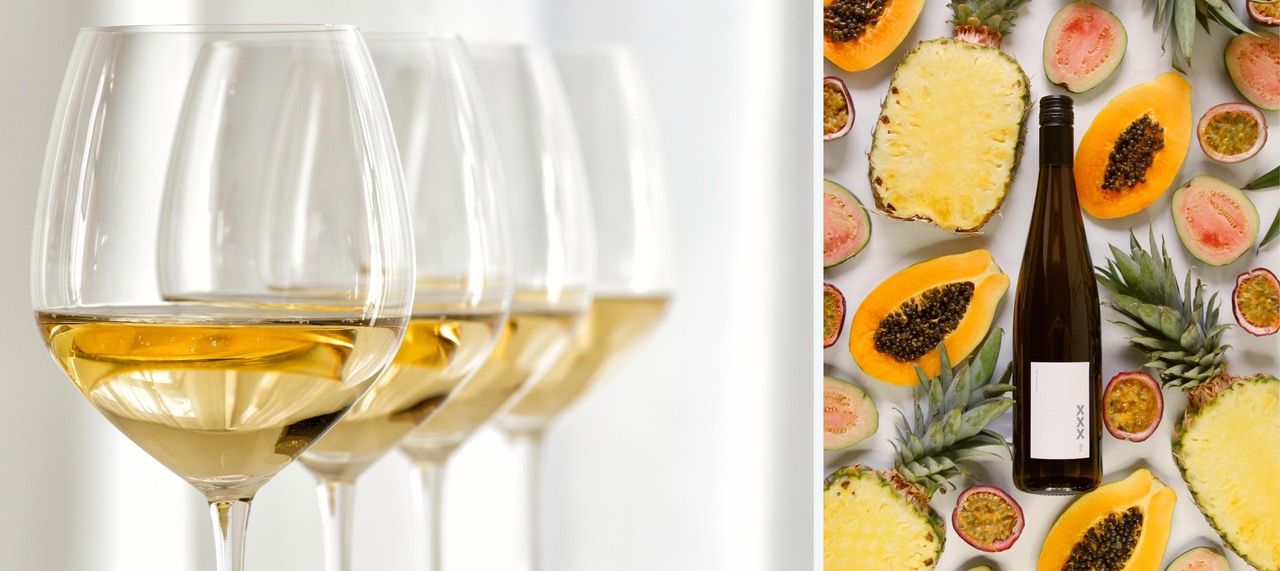 Introducing the 2021 XXX Gewürztraminer
Introducing the 2021 XXX Gewürztraminer
Considered one of the 18 Classic Noble Grapes, this deep pink coloured grape requires just the right combination of factors to thrive, from temperature, optimum soil, and protection from pests. The cultivation process is all worth it however, as once the grapes are harvested, the pink skins are removed, and the juice fermented into an exciting wine that is white in colour and an adventure for the taste buds.
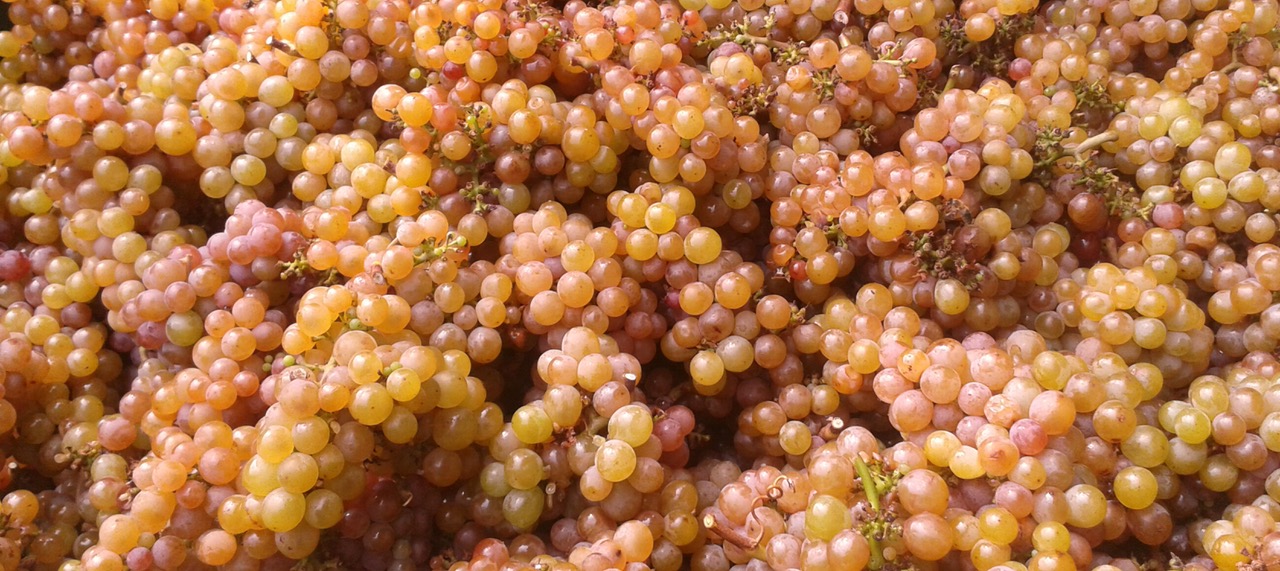
Okanaganers agree, as Gewürztraminer is much enjoyed in the Okanagan valley. According to BC Wine Trends, the Gewürztraminer grape is the third most-produced white grape in British Columbia. Pinot Gris and Chardonnay take first and second place in that tally.
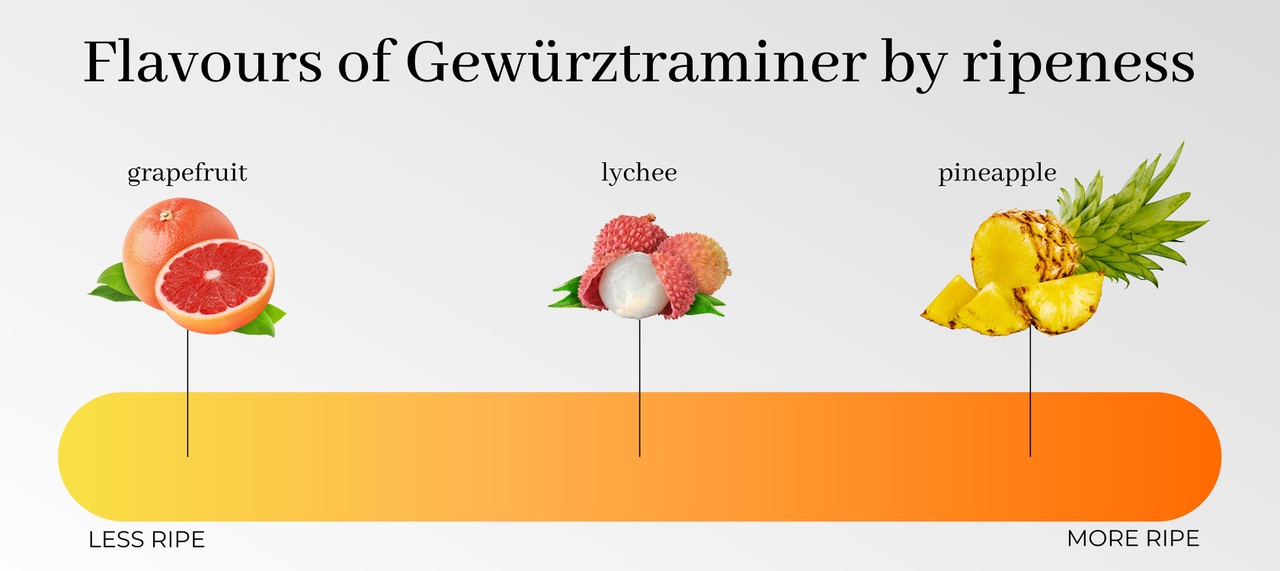
Properties of Gewürztraminer
Gewürztraminer is not to everyone’s taste but it certainly has a lot to offer. Those who like Moscato, dessert wines, or tropical fruits will be into what this wine brings. The wine can have a distinct spiciness, ("Gewürz" translates to herb, or spice), and is a little on the sweeter side. Side note- the wine often tastes sweeter than it actually is due to aromas, higher alcohol, and lower acidity.
Gewürz often is said to have a Lychee flavour. It is higher in alcohol, full-bodied, and aromatic, offering possible notes of pineapple, ginger, apricot, citrus, rose and more!
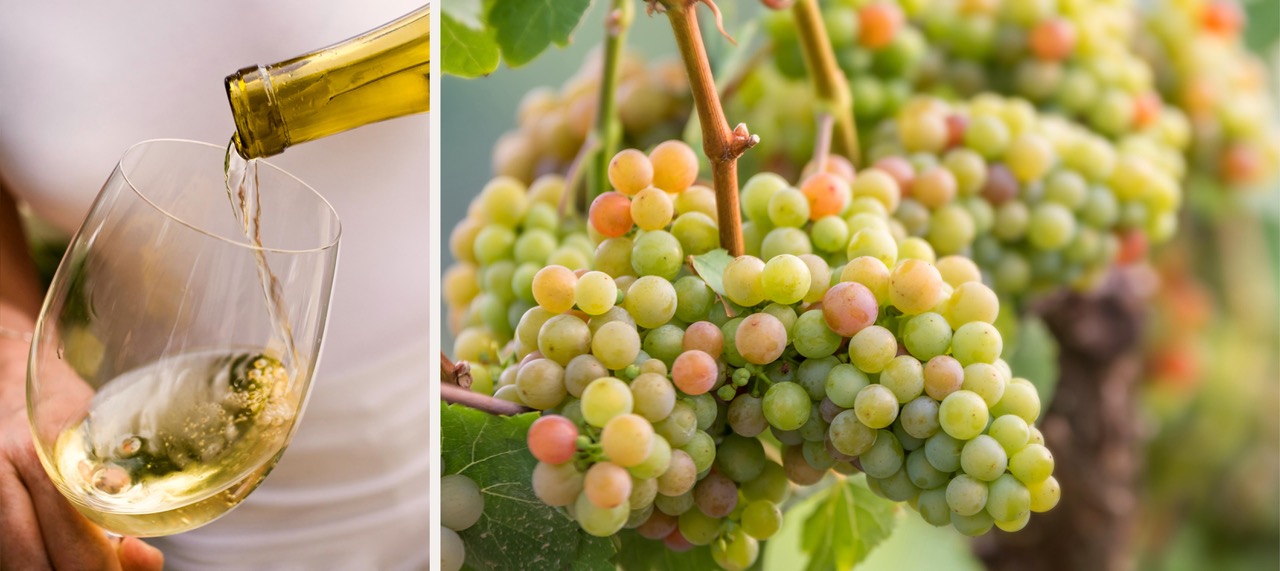
Food Pairing & How to Enjoy Gewürztraminer?
True to its eccentric nature, Gewürztraminer can be a challenge to pair with. It generally balances spice and is paired with exotic flavours such as Indian or Thai cuisine. Meats that are often enjoyed alongside a glass of this wine are duck, shrimp, crab, chicken, bacon, and pork.
Serve it chilled, but not overchilled, to keep the wine’s subtle properties. Gewurztraminer is best enjoyed young with preserved acidity.
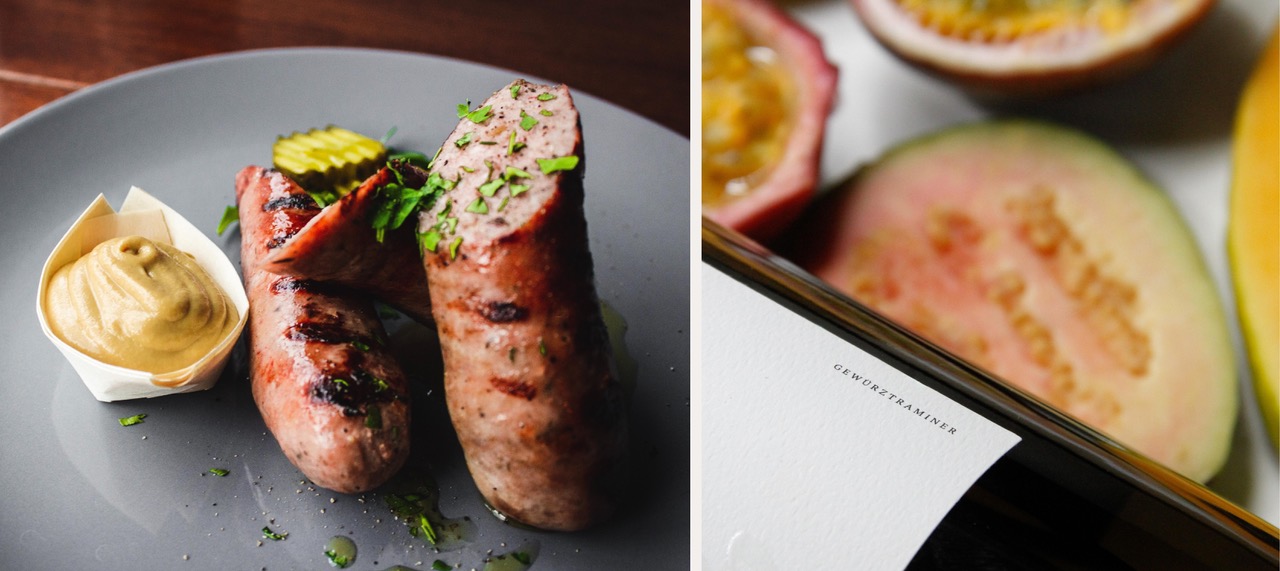 Grilled Chicken Gewürztraminer Sausage
Grilled Chicken Gewürztraminer Sausage
Be a part of history as we unveil our first-ever Gewürztraminer! Vibrant and juicy with a nice sweetness and spice. Enjoy the bursting summer flavours of lychee, passion fruit, with a hint of rose, pineapple, & guava with this white wine, available for purchase at the winery and in our online store. And if all that was not enough, you can also take advantage of a complimentary recipe for Grilled Chicken Gewürztraminer Sausage, provided by our Executive Chef, Danny Tipper. So go ahead and get your Gewürz on with Ex Nihilo!

The Versatile Charm of Rosé: The Saignée Process, & the Release of the Fabulous Vampata Rosé at Ex Nihilo!
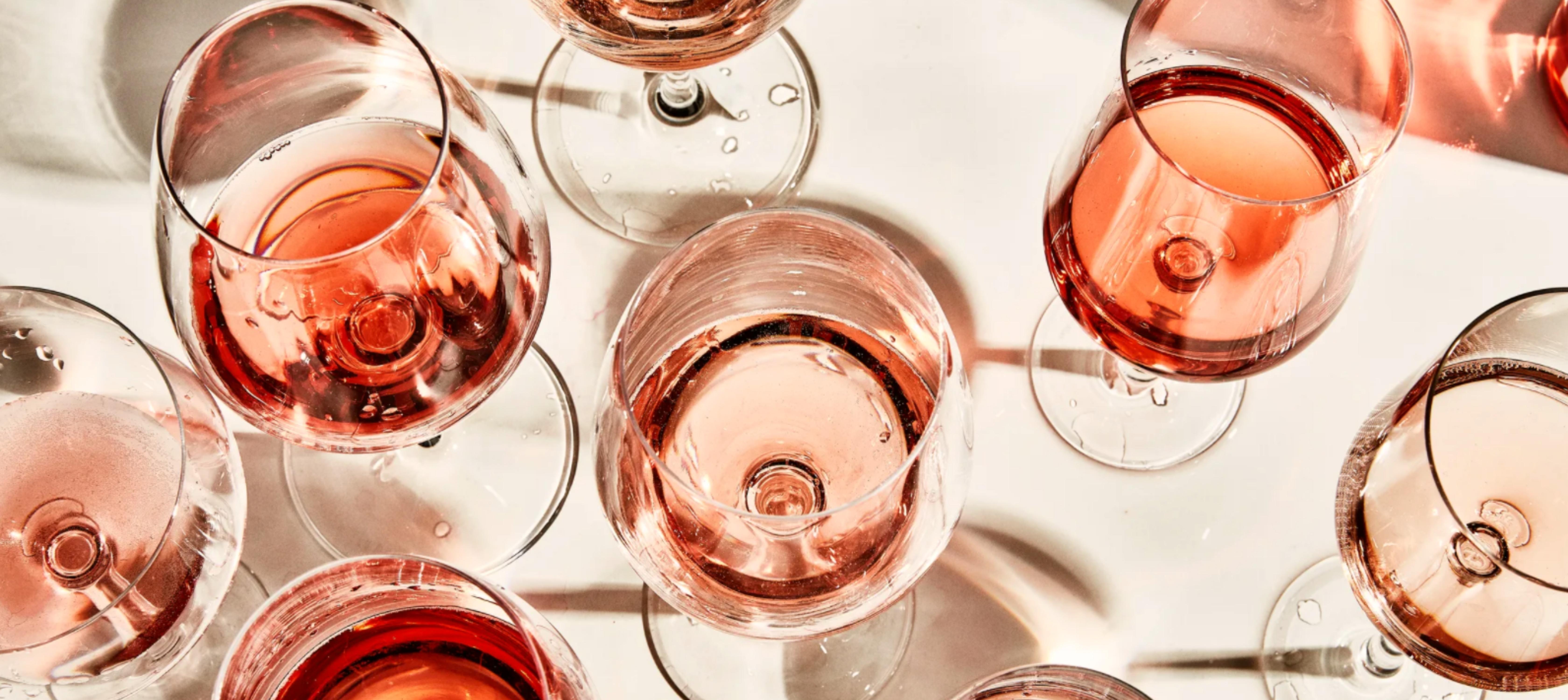
There is no wine more charming than a crisp rosé. Not only striking and intriguing in colour, the flavours and aromas offered by a lovely rosé are something to behold. One of the oldest wines, rosé’s popularity has experienced a resurgence. There are entire festivals dedicated to this wine classification, and with such versatility, we can understand why!
Rosé is probably best known for its’ fresh, fruity quality. Best served chilled, it is most popular in the spring to early fall, due to its refreshing essence. The area of the world most known for this wine is the Provence region of France, but there are plenty of great rosé wines throughout the world, especially right here in the Okanagan.
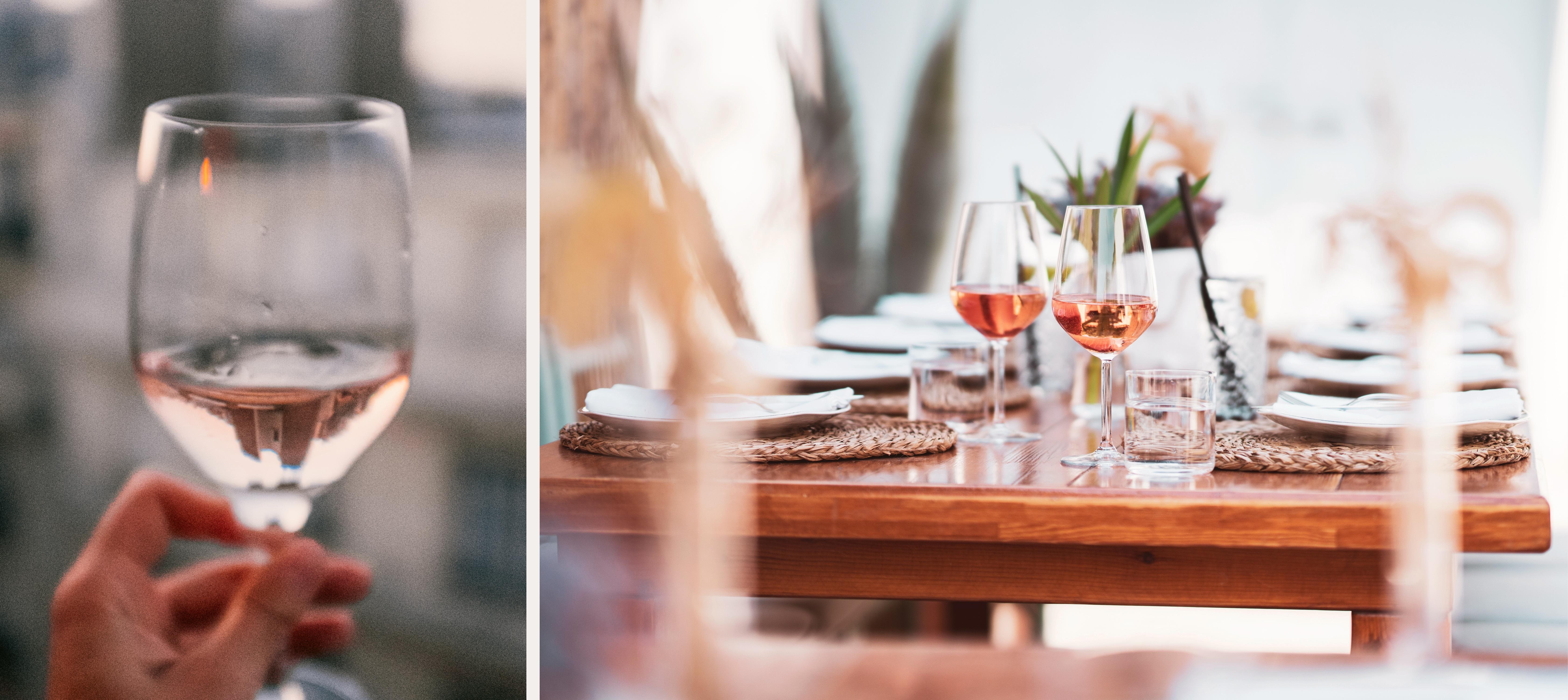
What are the Distinguishing Characteristics of a Rosé?
Rosé wines have a low to medium alcohol level with bright acidity. Various varieties of red wine grapes are used, sometimes in a blend. Some grape varieties used include Grenache, Pinot Noir, Syrah and more! Rosé can be sparkling, sweet, or dry, and is broken down into many different types such as:
- Provence Rosé
- Pinot Noir Rosé
- Zinfandel Rosé
- Cabernet Sauvignon Rosé
- Syrah Rosé
- Grenache Rosé
- Tavel Rosé
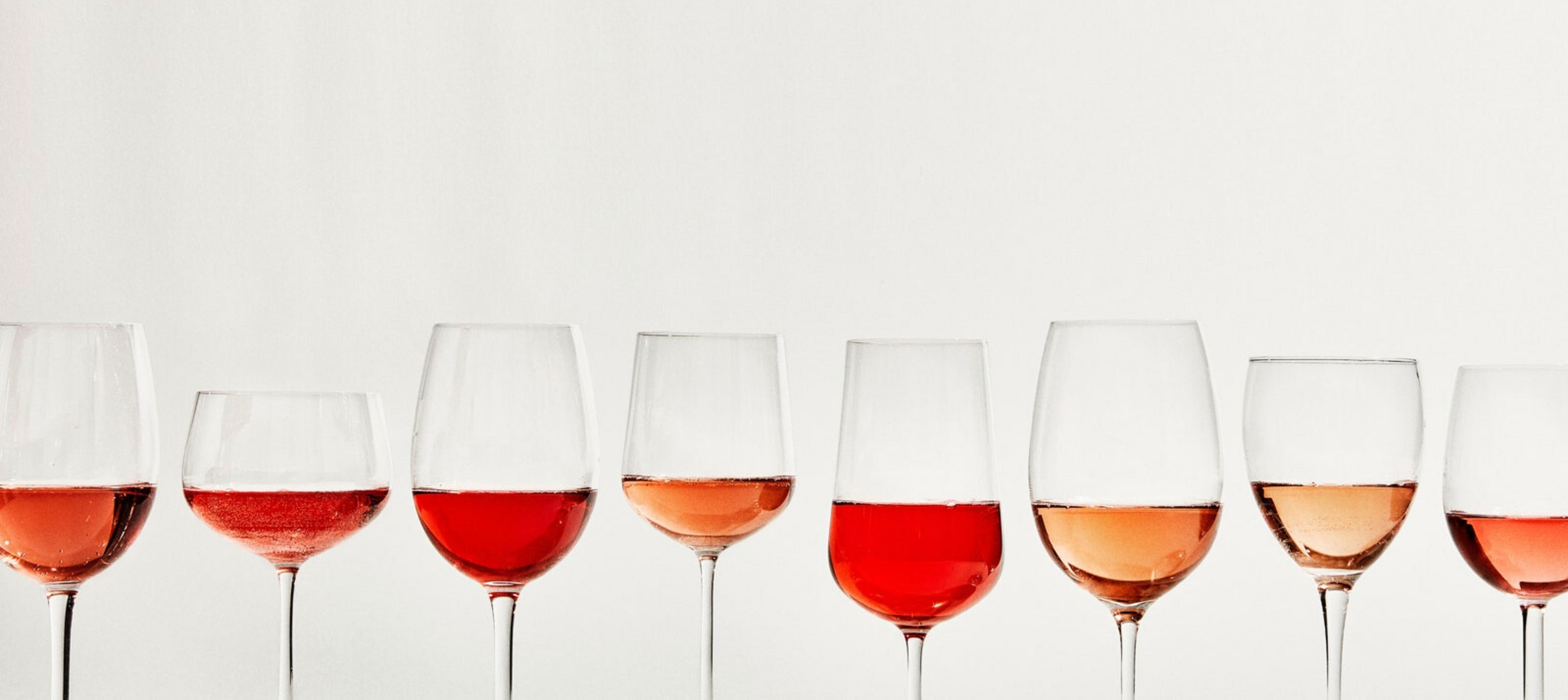
Common Methods of Making Rosé
Some people think that rosé is just a mixture of red and white wine, and sometimes it is, (this is called the blending method). This is most often not the case, however, and except for Rosé Champagne, actually, a practice sometimes frowned upon in the industry.
In the maceration method the grapes are destemmed, sorted, and left to rest/macerate with the juices for up to a few days until the optimum level of pink colour is achieved. The skins are then removed and the wine is made from the remaining juices. Maceration is the most popular method used to produce rosé, but a newer method, the Saignée process has gained popularity and it brings rosé to a different level.
What is the Saignée process?
The saignée (“sohn-yay”) process produces a slightly richer rosé, and involves the removal of a portion of the juice, increasing the proportion of skins in contact. The resulting concentration results in a more vibrant colour and a bit more tannin.
A Rosé Inspired Picnic With Ex Nihilo's Furry Pal Pyper
Rosé Food Pairings
While sipping this versatile wine, there are many great pairings. Look to dishes such as duck, salmon, and lamb. Soft cheeses, such as goat, incorporated into a charcuterie board are also a great option.
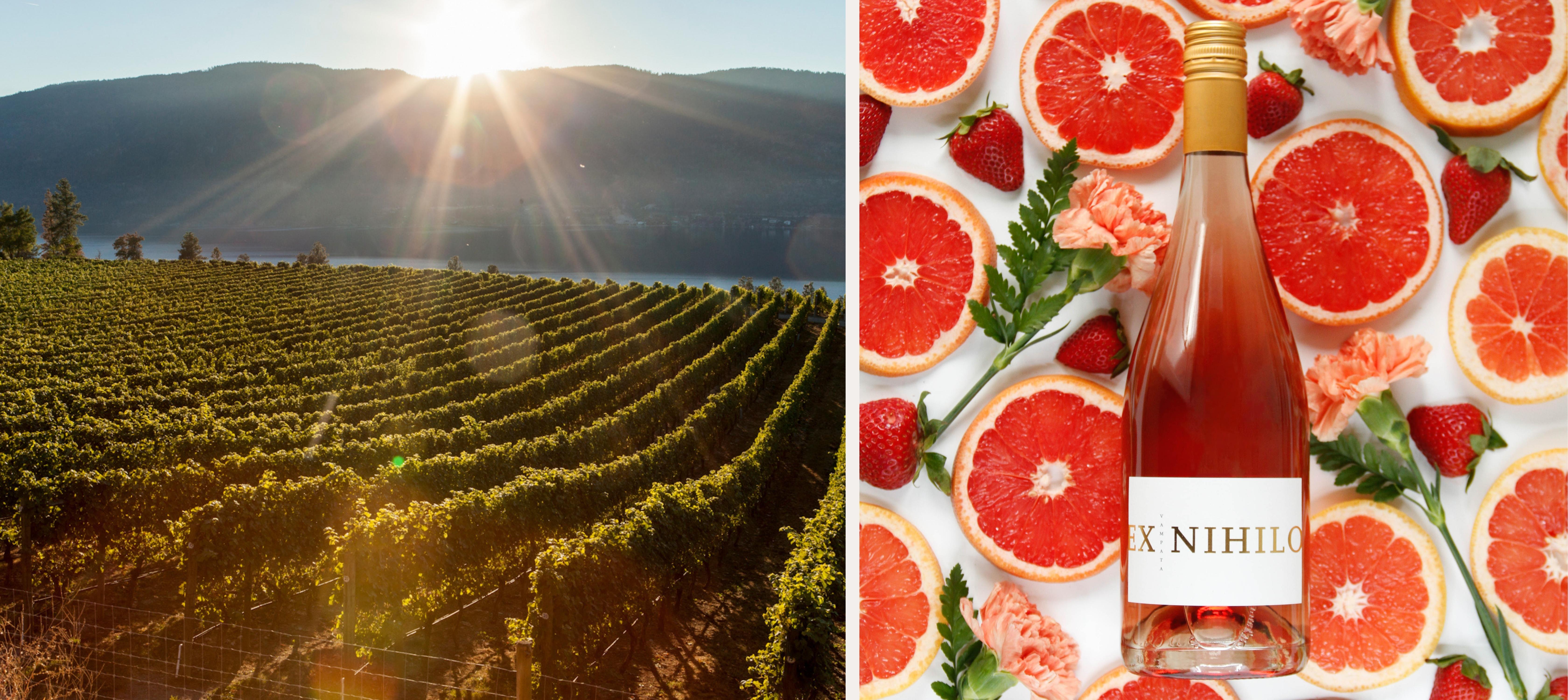
Release of the 2021 Vampata Rosé at Ex Nihilo
Ex Nihilo is excited to release its 2021 Vampata Rosé, a crisp pink delight, produced with the saignée process from pinot noir grapes. Enjoy summer in a glass, with aromas and flavours of strawberry, cranberry, grapefruit, rose hips and gooseberry. Order it from our online store, or venture down to the winery to grab a bottle, or two?


